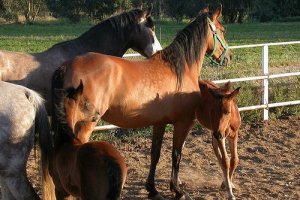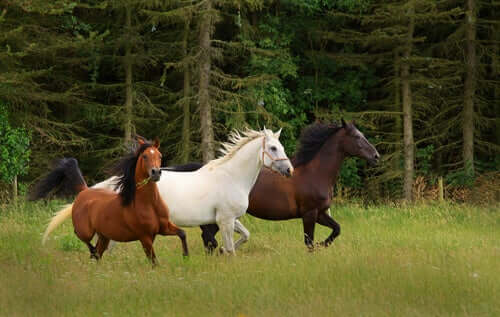How to Create the Right Space for Your Horse


Written and verified by the lawyer Francisco María García
Creating the right space for your horse involves more than just providing grass, food, and water. Horses have special needs for their development and for them to be able to meet the expectations of their owner or companion.
The benefits of having a horse
By owning a horse, you’re not just acquiring an animal for recreation or mobility. Horses are excellent for children’s physical and intellectual development, and they can also help the recovery of people with motor problems.
There are lots of physical activities that you can do with horses. Horse riding is just one, and there are several official or friendly competitive sports too.

However, before you think about buying or rescuing an animal this big, it’s important to be informed. You need to know how to properly care for them and create the right space for your horse.
How to prepare the right space for your horse
It’s a sad reality that a number of horses are mistreated or killed because of exploitation and inhumane treatment. The thoughtless use of animals in circuses, racing, games, and transportation simply shouldn’t be tolerated. And this poses a significant threat to the health and survival of many different breeds.
Responsible ownership is not just a matter for owners of small pets. Horse owners and people with other large animals need to meet their basic needs for their development and take the proper care in raising them.
4 fundamental care tips for breeding a horse
1. Good nutrition and hydration
Like all large mammals, horses need to stay hydrated to keep their physical strength and active metabolism. This is especially true when they’re kept out in the field during the summer. Make sure they’ve always got clean, fresh water.
Their food needs to be appropriate for their size, age, and levels of activity. A horse raised in a field can graze for more than 15 hours a day. This is because their digestive system needs a large amount of roughage to function properly.
The space for your horse should have a specific area for feeding and drinking, and you should make sure you change the water 2 to 3 times a day to stop it from getting contaminated.
If you’re raising a horse in a restricted or controlled space, you need to consider the amount of roughage you provide. You should store food in a dry place with not too much sun exposure to keep it fresh.
2. Dry spaces to rest and live together
Horses prefer to rest or sleep in dry places, whether at day or night, so make sure they have a warm and dry area for this. They should feel comfortable and safe so that they can recover between activities.
Another important aspect of a horse’s healthy development is how much they interact with other animals. Make sure there’s a space for them to be alongside others or take them to a place where they can integrate.
3. Space for aesthetic care and hygiene
A horse’s hygiene requires a great deal of attention, especially with their coat and hooves. Their coat requires brushing, grooming, and regular bathing to keep it beautiful and healthy. You should clean their hooves carefully to avoid hurting them.
Your horse should have a suitable, secure place for regular grooming. This is a good rule for all types of stables, regardless of size.
4. Provide affection and affection
It’s important to understand that horses need attention and affection, just like smaller animals. They’re sensitive, delicate, intelligent, and sociable animals. As a result, they should be treated with nobility and dignity.

Setting time aside to provide them with the affection they deserve is a vital part of caring for a horse, so it’s important to ensure that their space is suitable for humans too.
Just like other pets, horses also need vet visits now and again to check up on their health and address any concerns. Therefore, you should make sure that your horse has an area where they will feel safe enough for the vet to examine them.
Creating the right space for your horse requires knowledge and commitment. If you have any doubts, it’s always best to consult a specialist to make sure that you have all the necessary information.
Main image source: Paco
Creating the right space for your horse involves more than just providing grass, food, and water. Horses have special needs for their development and for them to be able to meet the expectations of their owner or companion.
The benefits of having a horse
By owning a horse, you’re not just acquiring an animal for recreation or mobility. Horses are excellent for children’s physical and intellectual development, and they can also help the recovery of people with motor problems.
There are lots of physical activities that you can do with horses. Horse riding is just one, and there are several official or friendly competitive sports too.

However, before you think about buying or rescuing an animal this big, it’s important to be informed. You need to know how to properly care for them and create the right space for your horse.
How to prepare the right space for your horse
It’s a sad reality that a number of horses are mistreated or killed because of exploitation and inhumane treatment. The thoughtless use of animals in circuses, racing, games, and transportation simply shouldn’t be tolerated. And this poses a significant threat to the health and survival of many different breeds.
Responsible ownership is not just a matter for owners of small pets. Horse owners and people with other large animals need to meet their basic needs for their development and take the proper care in raising them.
4 fundamental care tips for breeding a horse
1. Good nutrition and hydration
Like all large mammals, horses need to stay hydrated to keep their physical strength and active metabolism. This is especially true when they’re kept out in the field during the summer. Make sure they’ve always got clean, fresh water.
Their food needs to be appropriate for their size, age, and levels of activity. A horse raised in a field can graze for more than 15 hours a day. This is because their digestive system needs a large amount of roughage to function properly.
The space for your horse should have a specific area for feeding and drinking, and you should make sure you change the water 2 to 3 times a day to stop it from getting contaminated.
If you’re raising a horse in a restricted or controlled space, you need to consider the amount of roughage you provide. You should store food in a dry place with not too much sun exposure to keep it fresh.
2. Dry spaces to rest and live together
Horses prefer to rest or sleep in dry places, whether at day or night, so make sure they have a warm and dry area for this. They should feel comfortable and safe so that they can recover between activities.
Another important aspect of a horse’s healthy development is how much they interact with other animals. Make sure there’s a space for them to be alongside others or take them to a place where they can integrate.
3. Space for aesthetic care and hygiene
A horse’s hygiene requires a great deal of attention, especially with their coat and hooves. Their coat requires brushing, grooming, and regular bathing to keep it beautiful and healthy. You should clean their hooves carefully to avoid hurting them.
Your horse should have a suitable, secure place for regular grooming. This is a good rule for all types of stables, regardless of size.
4. Provide affection and affection
It’s important to understand that horses need attention and affection, just like smaller animals. They’re sensitive, delicate, intelligent, and sociable animals. As a result, they should be treated with nobility and dignity.

Setting time aside to provide them with the affection they deserve is a vital part of caring for a horse, so it’s important to ensure that their space is suitable for humans too.
Just like other pets, horses also need vet visits now and again to check up on their health and address any concerns. Therefore, you should make sure that your horse has an area where they will feel safe enough for the vet to examine them.
Creating the right space for your horse requires knowledge and commitment. If you have any doubts, it’s always best to consult a specialist to make sure that you have all the necessary information.
Main image source: Paco
This text is provided for informational purposes only and does not replace consultation with a professional. If in doubt, consult your specialist.








